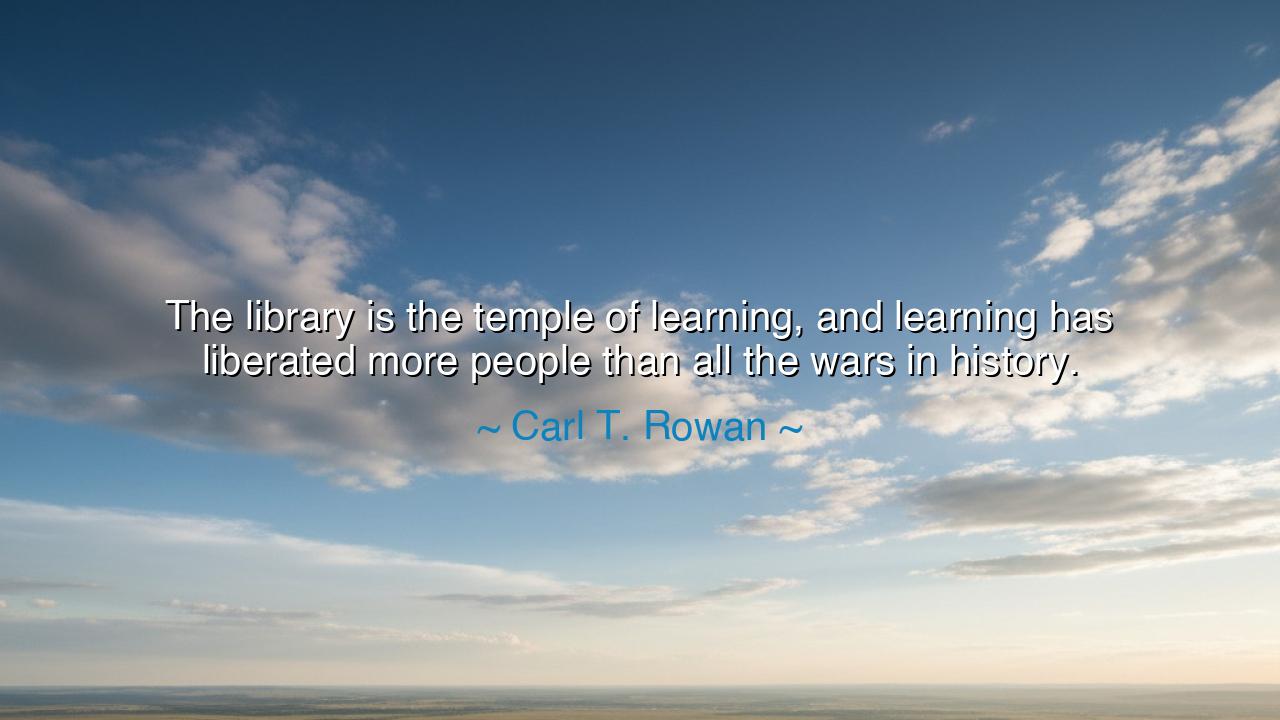
The library is the temple of learning, and learning has liberated
The library is the temple of learning, and learning has liberated more people than all the wars in history.






The great American journalist and diplomat Carl T. Rowan once proclaimed: “The library is the temple of learning, and learning has liberated more people than all the wars in history.” In this profound declaration, he offered not a mere reflection on books, but a hymn to the enduring power of knowledge. Rowan, who rose from humble beginnings in the segregated South to become one of the most respected voices of his generation, understood that true freedom is not won only by the sword — it is achieved through the mind. His words remind us that while wars may change borders, learning changes souls, and that the library, with its silent shelves and sacred order, is a holier battlefield than any drenched in blood.
The origin of this quote lies in Rowan’s lifelong belief that education was the great equalizer — a weapon more powerful than prejudice, and a path to dignity for all. Born in poverty in Tennessee during an era when opportunity was denied to many because of the color of their skin, Rowan discovered his liberation in books. The library became for him what the temple was to the ancients: a sanctuary of light in a world darkened by ignorance. To him, the library was not merely a building of paper and ink — it was a temple, where the spirit of humankind sought truth, wisdom, and deliverance from the chains of limitation.
When Rowan said that “learning has liberated more people than all the wars in history,” he spoke with the clarity of one who had witnessed both the triumphs and failures of human struggle. War may break the fetters of one nation, but knowledge breaks the fetters of the human condition itself. The revolutions that endure — the abolition of slavery, the birth of democracy, the empowerment of women — were not born solely from the noise of battle, but from the quiet awakening of minds that dared to question. Every page read, every idea shared, every truth uncovered is an act of liberation greater than the conquering of empires. For the sword can free a people’s land, but only learning can free their hearts.
Consider the example of Frederick Douglass, the great American abolitionist, who once said that knowledge was the pathway from slavery to freedom. As a boy enslaved, forbidden to read, he taught himself in secret — deciphering words on torn scraps of newspaper and stolen pages of the Bible. Through that sacred act of self-education, he discovered his true power. It was not the force of rebellion that first freed him, but the force of understanding. Once he learned to read, he could never again be enslaved in spirit. His mind became his weapon, and with his words he waged a mightier war than any fought by armies — the war for human dignity. This is the liberation Rowan speaks of: the emancipation that begins in the temple of learning.
In every age, the library has stood as both fortress and sanctuary. When tyrants seek to rule unchallenged, their first act is to burn the books; for they know that the light of wisdom cannot coexist with the darkness of control. The destruction of the Library of Alexandria was not merely the loss of scrolls, but the silencing of centuries of thought — an act of fear against the power of the human mind. Yet libraries rise again, in every land and every age, because the flame of curiosity is eternal. As long as there are seekers of truth, the temple of learning shall never be destroyed.
Rowan’s words also speak to the heart of democracy and human progress. He reminds us that the true liberation of humankind comes not from domination, but from enlightenment. The victories of science, the triumphs of social justice, the advances of civilization — all are born from minds that dared to ask, to learn, to dream. Wars end when ignorance ends; oppression crumbles when knowledge spreads. Thus, every book borrowed, every idea shared, every conversation born from curiosity is a small act of revolution. The library is not a quiet place — it is the beating heart of humanity’s freedom.
Let this be the lesson for our age: that if you wish to free yourself, or to uplift your people, begin not with the weapon but with the word. Enter the library as you would a temple; approach its shelves as altars of truth. Let your mind kneel before wisdom, and rise renewed. Do not seek victory over others — seek victory over ignorance, for that is the only conquest that endures.
And so, my children of the present world, remember this truth of Carl T. Rowan: books are the keys to freedom, and learning is the path to peace. Guard your libraries as you would your temples; fill them with voices, not silence. For in their pages dwell the armies of the mind — armies that fight not to destroy, but to enlighten, to heal, and to set the human spirit free.






AAdministratorAdministrator
Welcome, honored guests. Please leave a comment, we will respond soon